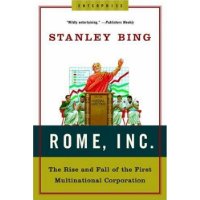
基本信息出版社:W. W. Norton
页码:224 页
出版日期:2007年02月
ISBN:0393329453
条形码:9780393329452
装帧:平装
丛书名:Enterprise
外文书名:罗马公司: 第一个跨国公司的兴衰
内容简介 在线阅读本书
The world's first corporate case study, as only the best-selling Stanley Bing could tell it.
A family business prospers through a series of brutal consolidations and rational growth. Then senseless internal conflicts lead to a long line of demented CEOs, monumental expansion, and foolish diversification—at a high cost in shattered lives. In the end, a series of reverse takeovers leaves the once-proud but now overextended and corrupt parent company at the mercy of less-civilized operations that previously cringed at the grandeur of the corporate brand.
Enron? WorldCom? Try Rome, whose rise and fall carry a moral that lingers to this day for the managers, employees, and students of any global enterprise. Stanley Bing—whose satirical business books are as savagely funny as they are insightful—mingles business parable and cautionary tale into an ingenious, often hilarious new telling of the story of the Roman Empire.
作者简介 Stanley Bing is the author of four humorous and eminently useful books on business, most recently the best-selling Sun-Tzu Was a Sissy, and two novels. He lives in New York City and works for a gigantic multinational conglomerate.
编辑推荐 From Publishers Weekly
Starred Review. Fortune columnist Bing (Sun-Tzu Was a Sissy) condenses the 1,200-year history of Rome into a slim, wildly entertaining satire for businessmen, particularly those who happen to be fans of HBO's Rome. Irreverent without ever slipping into Dave Barry–style logical anarchy, the volume renders epic history in corporate-speak, providing enough substance and insight along the way to keep readers' attention. As Bing notes, much of Roman history consists of "wars, wars and more wars," and he skips over big chunks of it. "I give up," he shrugs, focusing instead on the decisions and personalities of the colorful leaders, from Romulus to Caligula. Most interesting are the author's discourses on why Rome's "corporate strategy" worked so well for so long ("corporations willing to kill people do better than those which are not") and why its "corporate culture" was sufficiently strong to rally its citizens/soldiers/employees for an endless series of battles. And while wryly acknowledging that the Romans' use of "murder as a business tool" may be excessive in today's environment, Bing endorses many of their strategies as sound: "In any corporate transformation, a good housecleaning is absolutely called for." Word to the wise: if the guy in the next cubicle is reading Rome, Inc., watch your back—especially if it's the Ides of March. (May)
Copyright © Reed Business Information, a division of Reed Elsevier Inc. All rights reserved. --This text refers to the Hardcover edition.
Publishers Weekly
If the guy in the next cubicle is reading Rome, Inc., watch your back—especially if it's the Ides of March.
专业书评 From Publishers Weekly
Starred Review. Fortune columnist Bing (Sun-Tzu Was a Sissy) condenses the 1,200-year history of Rome into a slim, wildly entertaining satire for businessmen, particularly those who happen to be fans of HBO's Rome. Irreverent without ever slipping into Dave Barry–style logical anarchy, the volume renders epic history in corporate-speak, providing enough substance and insight along the way to keep readers' attention. As Bing notes, much of Roman history consists of "wars, wars and more wars," and he skips over big chunks of it. "I give up," he shrugs, focusing instead on the decisions and personalities of the colorful leaders, from Romulus to Caligula. Most interesting are the author's discourses on why Rome's "corporate strategy" worked so well for so long ("corporations willing to kill people do better than those which are not") and why its "corporate culture" was sufficiently strong to rally its citizens/soldiers/employees for an endless series of battles. And while wryly acknowledging that the Romans' use of "murder as a business tool" may be excessive in today's environment, Bing endorses many of their strategies as sound: "In any corporate transformation, a good housecleaning is absolutely called for." Word to the wise: if the guy in the next cubicle is reading Rome, Inc., watch your back—especially if it's the Ides of March. (May)
Copyright © Reed Business Information, a division of Reed Elsevier Inc. All rights reserved. --This text refers to the Hardcover edition.
Publishers Weekly
If the guy in the next cubicle is reading Rome, Inc., watch your back—especially if it's the Ides of March.